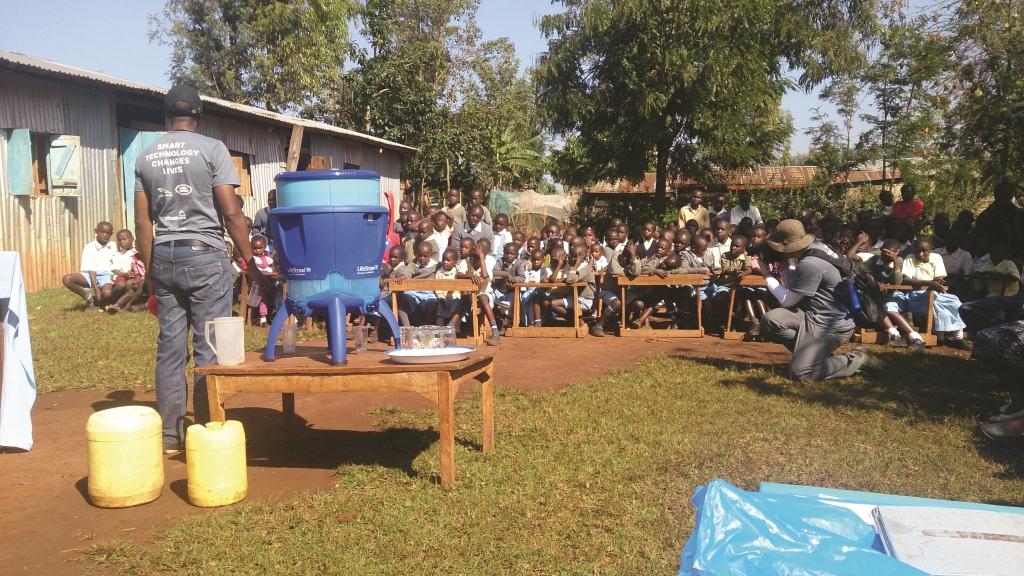Almost half of Kenya’s population has no access to clean water, according to the World Bank.
Waterborne diseases, such as cholera, typhoid, and hepatitis A, can ravage poorer communities; with women and children most at risk.
Three companies, Jaguar Land Rover, ClimateCare and Vestergaard, are trying to eradicate this problem by supplying schools, in Bungoma County, an agricultural region in Western Kenya, with water filters. The hope is that the children will not get sick if they drink safe water. They’ll then not miss school, be more likely to get good grades and increase their chance of seeing a brighter future.
It’s one of the most underdeveloped areas of Western Kenya. Infrastructure is almost non-existent. The buildings I entered had no plumbing or electricity. The houses and schools were made of mud, wooden poles and corrugated iron. They are dark and humid, like an oven baking in the sun.
The heat inside each classroom is stifling, each small desk is shared by three children – they barely have enough space to write. Many of their uniforms hang from their slight bodies. Parents are forced to buy uniforms that are too large so the children will grow into them. They need to last for years.
Loading...
Bungoma is an agricultural region. People are reliant on water from nearby streams or boreholes. Both sources are often contaminated by pit latrines.
The harsh elements in Bungoma contradict its natural beauty. The land is green, with small hills rolling as far as the eye can see. Large boulders are littered everywhere. The soil is red and rich in nutrients, making it easier to grow crops. Almost every house has maize, beans or bananas growing around it.
Poverty is rife, buildings are basic or falling apart, and although the main road is tarred and in decent condition, the rest are muddy and inaccessible by car.
Cars are rare anyway. Motorbikes and bicycles are the main form of transport. All are fitted with cushioned seats above the rear wheel to transport passengers. The makeshift taxis swarm along the roads. It seemed chaotic to me but they understand how the system works, and despite my fear, I never saw an accident.
Chicken and goats roam along the sides of the road, past the many spaza shops, cellphone airtime and data vendors, and bike repair shops. These are the most popular businesses for a community that relies on entrepreneurship to survive.
While delivering a water filter to one of the schools, a handful of us walked down a slippery and steep muddy road to a spring at the bottom. We passed women tending their crops, crushing maize or making bricks in large homemade clay ovens. Some are less enterprising though.
A 24-year-old man, spotting us walking through his neighborhood, was intrigued enough to leave his group of friends and the quarts of beer they were glugging. His intrigue soon turned to incredulity when told the filters were for the school and not his home. The fact that his four children would benefit from the filter did not placate him. He told us he needed one because he was poor. His lack of income, though, wouldn’t stop him from having more kids. He said he hoped to have three or four more.
Life is hard in Bungoma and any help is appreciated.
“My biggest hope is to be educated so that I can pass my exams and go to university and look for a job. My biggest challenge will be money, it may be the reason I will not achieve my dream,” says Vivienne Wafula, a shy nine-year-old schoolgirl.
Sharon Cherubet Chepkwemoi, the head girl at her school, dreams of becoming a doctor.
“I want to fix the many challenges that people here face,” she says.
She’ll need to go to university to achieve this.
“My parents are farmers, but they are not that rich, so it will be a challenge.”
Both girls are smart, ambitious and resourceful. Sadly, neither Wafula nor Chepkwemoi are likely to escape the grip of poverty in a part of Africa forgotten by the rest of the world.
Loading...
